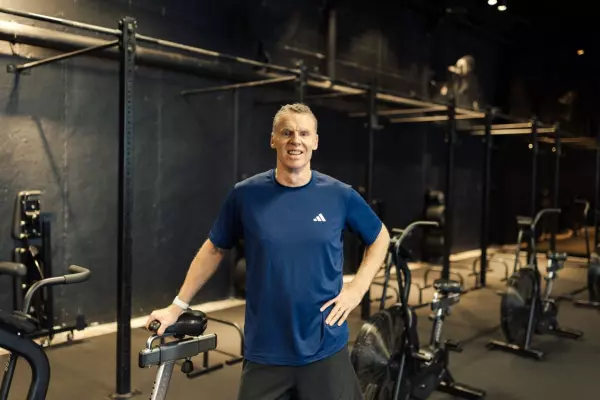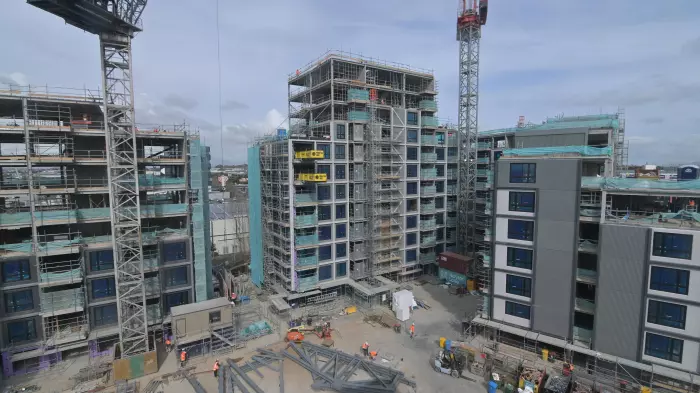Two Kiwi innovators are hoping to transform New Zealand’s commercial food industry space by investing almost $13 million into creating and building the country’s first purpose-built ‘cloud kitchens’.
Co-founders Harrison Stott and Rob Humphrys said they hope to provide a “home and community” for food creators in NZ that supports the small and big players in the food industry through The Kitchen Collective, their commercial kitchen space startup.
Since the pair threw open the doors to their commercial co-working kitchen space in the Christchurch CBD last May, its immediate popularity has encouraged them to add an extra six kitchens to the location.
They’re now just weeks away from finishing the last details to their new Kitchen Collective Auckland premises in Glendene which they plan to open in early May.
The new location holds 20 private kitchens, one co-working kitchen space with 8 workbenches for rent and a walk-in cold room and walk-in freezer storage along with dry storage facilities throughout the space.
“Auckland is definitely the centre point for everything,” Stott said. “This is where we're probably going to be based now because of the size of the population here.”
Humphrys said that through reimagining kitchen space and food delivery systems, The Kitchen Collective offered “something for everyone” no matter where they sat on the food industry spectrum.
'Unreckoned market'
Stott said accessible commercial kitchen space is an “unreckoned market” in NZ and an area that he thinks will grow hugely in NZ’s food industry over the next few years as businesses adjust to a post-pandemic world.
“There’s nowhere else you can find commercial kitchen space in Auckland or Christchurch at the moment that has the right equipment, the right sort of set up and is purpose-built for all your commercial food needs,” he said.
They might be building the first multi-purpose cloud kitchens in NZ but it’s not the first time the two NZ innovators – who in classic Kiwi fashion were friends at school together – have been involved in innovating the commercial kitchen space.
Both have extensive experience in the technology sector and Stott was a key contributor in raising £252m (NZ$476m) funding for UK commercial kitchen, co-working and storage startup Karma Kitchen.
Humphrys has drawn on his experience working as an innovation programme manager at Uber Eats in London and knowing the ins and outs of the largest delivery platform in Australasia has come in useful when working out how The Kitchen Collective can bring new ideas into the food delivery sector.
Stott said both Kitchen Collective hubs offer “fully-furnished” private kitchens that are available to rent for a minimum of a year starting at $2,000 per month.
People with smaller budgets or businesses would be able to rent “coworking kitchen space” that would be available around the clock, he said and all their kitchens provided core kitchen equipment, but people were welcome to bring equipment and utensils as well.
“We're doing what we think is the best fit overall and hopefully that works so they can get started on the right foot,” Stott said.
“Tenants can also bring specialised equipment but the cost is a lot less through our set-up – all the kitchens have been designed slightly differently so we have that flexibility and variety.”
Humphrys said another aspect that they hope to innovate through The Kitchen Collective is how they’ve modelled the business to fit around food delivery systems.
“We don't seem to have quite the same innovation that’s occurred overseas,” he said.
'Slight tweaks'
Together, their Christchurch and Auckland sites have cost $12.6m to build and get off the ground.
Stott said it's thanks to smart business planning and sticking to a tight building schedule there had been very few bumps along the way and this helped them keep costs down and the budget blowing out.
He said they have plans to start building other Auckland sites in the near future but want to get their Glendene location going first.
“Each site will be different depending on the location,” Stott said. “We're not sold just on doing the same thing again and again so there will be slight tweaks.”
Surprisingly, the pandemic hasn’t created “too much difficulty” in getting The Kitchen Collective off the ground. In some ways, Stott said, the pandemic has had a lot of positives for them as people, both part of and outside the commercial food businesses, have been much more receptive to change and new ideas.
“This model doesn't make sense for some people, and I get that,” he said.
“But it does make sense for others, and I personally think this is going to change how people look at commercial kitchen spaces.”
Stott hopes that by having an open-plan model, businesses can work together side by side and “cross-pollinate with each other”.
A baker might be able to supply a delivery-only business, meaning both businesses could create extra revenue for themselves, he said.
“I care about the tenants coming into the space and I think it's so important because we're not a landlord that just rents out space – we want to try to figure out ways we can help them with their business.”
Chief executive officer of the Restaurant Association, Marisa Bidois, said from a cost perspective, business models like The Kitchen Collective made “good financial sense” for restaurants and other food services that had particularly struggled through the pandemic.
“I think a lot of businesses are examining their business structures and looking at different ways of doing things and this kind of set up could work really well as people try new products or develop new venues,” she said.
“There are a lot of costs involved with bricks and mortar premises.”
Stott also thinks The Kitchen Collective could provide hope for the number of hospitality businesses that are struggling through the pandemic.
“Places like us could actually help overcome these challenges together,” he said.
“That’s what we’re trying to offer through The Kitchen Collective.”














